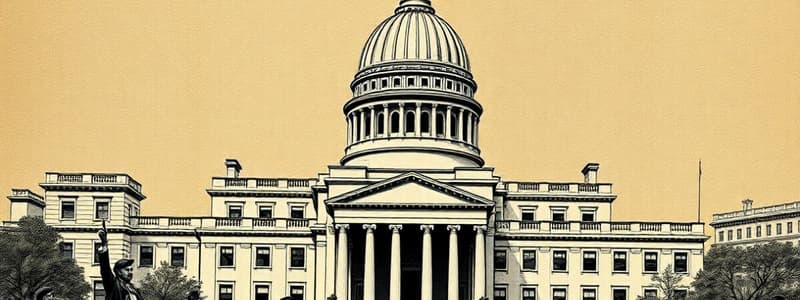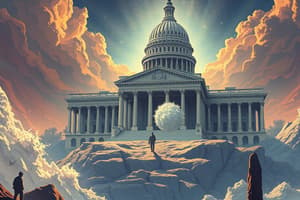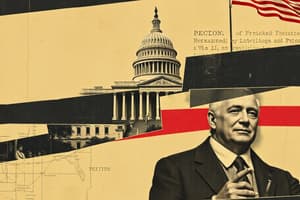Podcast
Questions and Answers
Which policy is associated with Nixon's administration?
Which policy is associated with Nixon's administration?
- Supply-side economics
- War on Poverty
- Great Society program
- Revenue Sharing (correct)
What is a characteristic of Categorical Grants?
What is a characteristic of Categorical Grants?
- Federal money with no spending restrictions
- Federal funding mandated for specific purposes (correct)
- States have full discretion on spending
- Allows states to receive funds without following federal laws
Which statement describes Libertarians best?
Which statement describes Libertarians best?
- They support high taxes and extensive government regulations.
- They advocate for low government intervention in both economic and social matters. (correct)
- They believe in stringent government control over personal choices.
- They promote strong military presence to maintain order.
What issue contributes to lower voter turnout among American youth?
What issue contributes to lower voter turnout among American youth?
What is an Unfunded Mandate?
What is an Unfunded Mandate?
What is a hallmark of Reagan's economic policies during his presidency?
What is a hallmark of Reagan's economic policies during his presidency?
What distinguishes Block Grants from other forms of funding?
What distinguishes Block Grants from other forms of funding?
What is a key reason for lower voter turnout among young Americans?
What is a key reason for lower voter turnout among young Americans?
Which characteristic is associated with Authoritarian political ideology?
Which characteristic is associated with Authoritarian political ideology?
What does an unfunded mandate require state governments to do?
What does an unfunded mandate require state governments to do?
Flashcards
Federalism
Federalism
A system of government where power is shared between a national government and state governments.
Supply-Side Economics
Supply-Side Economics
A government policy that aims to stimulate the economy by reducing taxes and regulations on businesses, in the belief that this will lead to increased investment, hiring, and economic growth.
Categorical Grant
Categorical Grant
A type of federal grant that gives money to states with specific conditions on how it must be spent.
Revenue Sharing
Revenue Sharing
Signup and view all the flashcards
Block Grant
Block Grant
Signup and view all the flashcards
Libertarian
Libertarian
Signup and view all the flashcards
Liberal
Liberal
Signup and view all the flashcards
Conservative
Conservative
Signup and view all the flashcards
Authoritarian
Authoritarian
Signup and view all the flashcards
Great Society Program
Great Society Program
Signup and view all the flashcards
Study Notes
Federalism and Federal Policies
- Johnson (1963-1969): Implemented the Great Society program, including a "War on Poverty."
- Nixon (1964-1974): Sought to reduce some Great Society programs but expanded government regulation and healthcare.
- Reagan (1981-1989): Advocated supply-side economics ("trickle-down" theory). Proposed reducing taxes and government size, believing this would stimulate economic growth through increased investment and hiring.
Grants-in-Aid
- Mandates: Federal laws requiring states to meet specific conditions in exchange for federal funding.
- Unfunded Mandates: Federal laws imposing costs on states without providing funding.
- Intergovernmental Lobby: State and local officials who actively lobby Congress for federal funding.
- Categorical Grants (Johnson): Federal funds given to states with strict guidelines on how the money can be spent.
- Revenue Sharing (Nixon): Federal funds given to states with few to no strings attached, allowing more flexibility in spending.
- Block Grants (Reagan): Federal funds given to states with more flexibility in spending and use.
- States have more say on how to spend the funds.
Public Opinion
- Problems with Polling: Ignorance, wording of questions, changing public opinion, and margin of error.
- A good poll has a margin of error of ±3%, and typically surveys at least 1,000 people.
Political Ideology
- Liberals: Advocate for government intervention in the economy to reduce income inequality, higher taxes on the wealthy, less military spending, freedom of speech/press, and a woman's right to choose.
- Conservatives: Favor limited government intervention in the economy, support a strong military, greater state power, free enterprise, and usually oppose abortion (often termed "pro-life"). Often advocate for lower taxes, less welfare, more law enforcement, and a stop to "un-American" behavior.
- Libertarians: Economic conservatives and social liberals, emphasizing individual freedom and limited government intervention across the board.
- Authoritarians: A mix of social conservatism and economic liberalism; support government regulation to maintain order and equality.
Political Elite
- Political Elite: Individuals with significant influence in political decision-making.
Voter Turnout in the US
- Lower Voter Turnout Reasons: Younger people vote less frequently, frequent moves requiring voter registration, varying state registration laws, satisfaction with the current government status quo, and the difficulty of registration (generally more difficult compared to Europe, despite more opportunities in the U.S.).
- Americans vote more often in general elections than many European countries.
- Registration through driver's licenses (motor voter law).
Studying That Suits You
Use AI to generate personalized quizzes and flashcards to suit your learning preferences.




